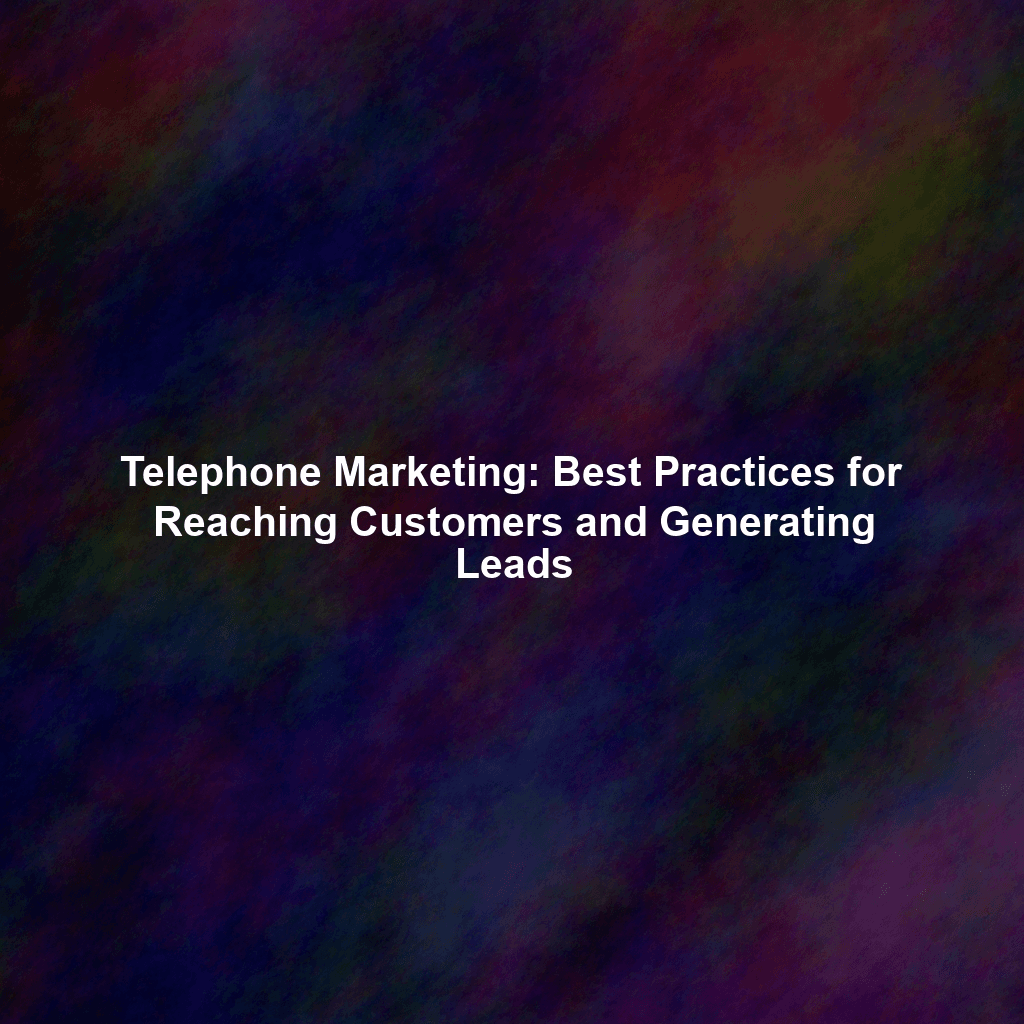In today’s digitally dominated world, it’s easy to overlook the power of a simple phone call. While online marketing grabs headlines, telephone marketing remains a potent, personalized, and often highly effective tool for reaching customers and generating leads, especially when integrated within a broader non-digital marketing strategy. This guide explores the best practices for telephone marketing, providing you with actionable steps to create compelling scripts, handle objections gracefully, and track your results effectively and ethically.
Why Telephone Marketing Still Matters
Despite the rise of email, social media, and instant messaging, telephone marketing offers several unique advantages:
- Personal Connection: A phone call allows for a direct, two-way conversation, fostering a deeper connection than impersonal digital channels.
- Immediate Feedback: You can gauge a prospect’s interest and address their concerns in real-time.
- Relationship Building: Thoughtful conversation can build trust and rapport, leading to stronger customer relationships.
- Cut Through the Noise: In a world saturated with online content, a well-timed phone call can stand out.
Crafting a Compelling Telephone Marketing Script
A well-crafted script is essential for successful telephone marketing. However, avoid sounding robotic. The goal is to guide the conversation, not dictate it.
Key Elements of an Effective Script
- Introduction: Clearly state your name, company, and the reason for your call. Be polite and professional.
- Value Proposition: Quickly highlight the benefits your product or service offers to the specific customer you’re calling. Tailor your message!
- Engaging Questions: Ask open-ended questions to understand the prospect’s needs and challenges.
- Call to Action: Clearly state what you want the prospect to do next (e.g., schedule a meeting, visit your website, receive a brochure).
- Flexibility: Remember, the script is a guide. Be prepared to deviate from it based on the conversation.
Example Script Snippet
“Good morning/afternoon, [Prospect Name]. My name is [Your Name] calling from [Your Company]. We help businesses like yours [mention specific benefit, e.g., ‘reduce their energy costs by up to 20%’]. I’m calling to see if you might be experiencing similar challenges with [relevant area related to your product/service]?”
Handling Objections with Grace and Skill
Objections are a natural part of the sales process. Handling them effectively can turn a “no” into a “yes.”
Common Objections and How to Address Them
- “I’m not interested”: Acknowledge their disinterest politely. “I understand, [Prospect Name]. May I quickly explain the core benefit for similar companies? It may be relevant to you.”
- “I don’t have time”: “I respect your time. Would it be alright if I called back at a better time for you?”
- “I’m already using a similar service”: “That’s great! How satisfied are you with their performance in [specific area]? We often help companies improve in that area by [mention specific advantage].”
- “It’s too expensive”: Focus on the value and ROI. “While our solution might seem like an investment, it often pays for itself in [timeframe] through [mention cost savings or increased efficiency].”
Key Principles for Handling Objections
- Listen Attentively: Truly understand the objection before responding.
- Acknowledge Their Concerns: Show empathy and understanding.
- Provide Value-Based Answers: Focus on the benefits of your product or service.
- Stay Positive and Respectful: Even if you can’t overcome the objection, leave a positive impression.
Tracking Your Results Effectively
Without tracking, you won’t know what’s working and what’s not. Implement systems to measure your telephone marketing efforts.
Key Metrics to Track
- Number of Calls Made: The total volume of calls.
- Contact Rate: The percentage of calls that connect with a decision-maker.
- Lead Conversion Rate: The percentage of calls that result in a qualified lead.
- Sales Conversion Rate: The percentage of leads that convert into sales.
- Cost Per Lead: The cost associated with generating each lead through telephone marketing.
Tools for Tracking
- CRM Software: Manage customer interactions, track call outcomes, and analyze performance.
- Spreadsheets: A simple way to track basic metrics.
- Call Tracking Software: Provides detailed call analytics, including call duration, recordings (with consent), and lead source attribution.
Ethical Considerations in Telephone Marketing
Ethical telephone marketing is crucial for building long-term trust and avoiding legal issues.
Key Ethical Practices
- Respect the Do-Not-Call List: Always check the Do-Not-Call Registry and adhere to its guidelines.
- Be Transparent: Clearly identify yourself and your company.
- Obtain Consent: Get explicit consent before recording any calls.
- Be Truthful: Avoid making misleading or exaggerated claims.
- Respect Boundaries: If a prospect asks you to stop calling, honor their request immediately.
Integrating Telephone Marketing with Other Non-Digital Strategies
Telephone marketing works best when integrated with other non-digital approaches. Consider these strategies:
- Direct Mail Follow-up: Send a postcard or letter introducing your company and then follow up with a phone call.
- Event Promotion: Use phone calls to invite prospects to attend a seminar, workshop, or trade show.
- Referral Marketing: Call existing customers to ask for referrals.
- Local Advertising: Combine telephone marketing with print ads in local newspapers or magazines.
Conclusion
Telephone marketing, when executed strategically and ethically, remains a valuable tool for connecting with customers and generating leads. By crafting compelling scripts, handling objections skillfully, tracking your results diligently, and prioritizing ethical practices, you can unlock the full potential of this powerful, personalized marketing channel within your non-digital strategy. Don’t underestimate the power of a well-placed phone call – it can make all the difference.
 Skip to content
Skip to content

